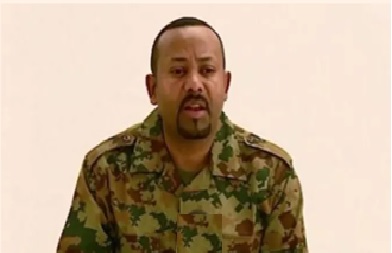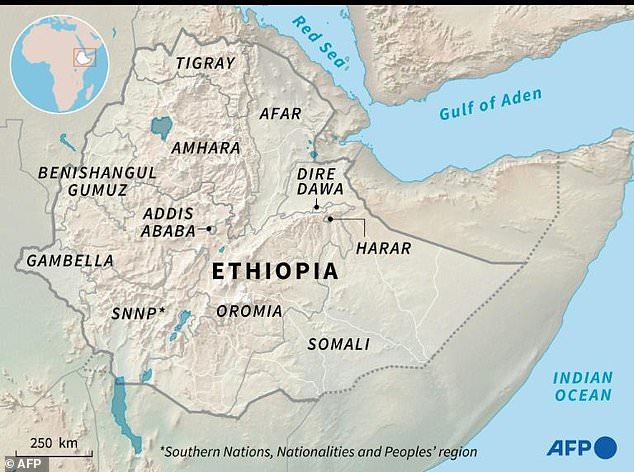“For all his promises of a swift victory, Abiy now faces a protracted civil war that could suck in other ethnic groups — or, to quote from his acceptance speech in Oslo last December, “brothers slaughtering brothers on the battlefield.” Bobby Ghosh of Bloomberg
By Faisal A. Roble

On the eve of the US presidential election, Prime Minister Abiy Ahmed of Ethiopia declared war against the politically outsized Tigray region. The onslaught is thus far justified by the government of Ethiopia as enforcing “law and order.”
Wary of the potential devastation of the conflict, International Crisis Group warned that a “prolonged conflict, which at this point looks plausible, would test the integrity of the Ethiopian state and armed forces, already shaken by numerous outbreaks of violence across the federation.”
The most dangerous additions to the conflict are the potential outbreaks of a renewed conflict in the Oromia and Beneshangul-Gomuz regions, both of which have tenuous relationships with Addis Ababa.
Even if the conflict does end in the foreseeable future, given the layers of ethnic, regional, religious, economic, and political cleavages makes its spill over to other regions plausible. As Reuters reported, the Amhara region is already a player in that “Prime Minister Abiy Ahmed had increasingly fallen back on support from forces of Tigray’s southern neighbor Amhara inground fighting – raising the risk of ethnic violence.”
In less than two weeks, death on both sides soared and over 30,000 Ethiopians were displaced. What is not clear is the damages Ethiopian air raids have caused since no independent journalists are allowed by the Ethiopian government. In retaliation, and in what the Ethiopian government calls a “desperate effort to globalize a local issue, Tigray hit multiple times several sites in Gonder, Bahirdar of Amhara region, and Asmara of Eritrea by using expropriated long-range rockets.
As if that was not numbing enough to the world’s conscience, massive human rights violations have been committed, although forensic experts have yet to identify the perpetrators of the heinous civilian massacre in Mal Kadra town inside Tigray. The cumulative impacts exacted against innocent people within a week’s time on both sides to the conflict, including massive manhunt targeting Tigrayan officials in the government plus the state fragility, prompted a Western student of Ethiopia to say that Ethiopia is “spiraling out of control.”

Owing to the geopolitical importance of Ethiopia, the conflict quickly took an international dimension. Eritrea is said to have directly involved in the conflict; fear is stoking that Egypt and Sudan, both of whom have a simmering disagreement with Ethiopia over the Grand Dam, are carefully following developments; United Arab Emirate’s drones stationed at Massawa are reported to have carried out sorties against TPLF strongholds.
Distant countries such as Turkey, Saudi Arabia, China, and Qatar each having investments in Ethiopia are sitting on the fence for a possible role in this speedily globalizing local conflict. An exception to this is the EU, Great Britain, and the Vatican as well as Djibouti have called for a mediated settlement of the conflict.
As PM Abiy rebuffs worldwide call to halt the onslaught, Demeke Mekonen, Deputy Prime Minister of Ethiopia, who doubles up this position as the Foreign Minister, is on a multi-country middle and Horn of Africa shuttle diplomacy to wield full support for his country. Prior to this, he had conducted virtual talks with Latin American diplomats stationed in Addis Ababa.
Beyond “Law and Order”
Vowing to introduce liberal democracy, Prime Minister Abiy quickly won much adulation from the Western world as well as Africans. Within the first year of coming to office, the less known former colonel in the Ethiopian army acted quickly, lifting a state of emergency” that he was instrumental in designing, freeing thousands of political prisoners and vowing to hold fair elections in 2020”, wrote the December issue of the Economist.
The Nobel Prize for Peace given to PM Abiy in 2019 was predicated on signing a peace deal with Eritrea and the implementation of the cessation of hostilities. Accordingly, the UN Secretary-General who recognized all positive changes Prime Minister Abiy introduced to the region in his early days in office led many to believe that a new wind of change was blowing across the Horn of Africa.
Posthumously, though, many including the New York Times and the Washington Post raised doubts whether the peace deal with Isaias Afworke of Ethiopia was rather to create a united front against TPLF. TPLF was the archenemy of Issaias Afworke and a political roadblock to PM Abiy’s dream to centralize power and do away with multinational federalism.
Ethiopia, as the lone surviving empire and a complex multinational country, has been established and maintained together by mere brute force. The current conflict in Tigray is within this construct of holding Ethiopia together forcefully. Prime Minister Abiy feels that TPLF defies and de-legitimizes his rule when it held and won over 90% of the regional election in September 2020. Those who support Abiy to crash TPLF think that the current conflict in Tigray has its roots in the control over the economy of Ethiopia. Indeed, there are layers of disagreements between Prime Minister Abiy and TPLF. But crashing TPLF and destroying Tigray’s economic base is unconventional for a Nobel Laureate.
Buoyed by the endorsement of the country’s parliament – a parliament that resembles more like the Russian Duma – plus the full support of the Amhara regional government, the Prime Minister vowed to bear the full weight of Ethiopian armed forces to enforce “law and order” on what he calls the “junta of TPLF.” So far, about 96 top TPLF party operatives have been identified.
Additionally, reports coming from various parts of the country testify that there is a massive hunt of TPLF functionaries inside and outside of the military establishment. Reuters has reported that all Tigrayan soldiers stationed in Somalia have been disarmed and dismissed. Ironically, most of the indicted “junta TPLF criminals” are former close associates of the Prime Minister who worked under TPLF for over 25 years.
Founded by college students in the early 1970s, TPLF under the auspices of the late Meles Zenawi, who ruled Ethiopia with an autocratic iron fist for over a quarter of a century, suffers from an empathy deficit by the masses of Ethiopia. More people are willing to see TPLF cabal punished severely for what it had done to the residents of the other eight regions plus Addis Ababa. The difficulty lies in separating such a punishment from hurting the masses of Tigray
No doubt TPLF has committed serious crimes, although it did under the umbrella organization of Ethiopian People’s Revolutionary Democratic Front (EPRDF) to which most of the officials of the Prime Minister’s Prosperity Party belonged for well over 25 years. What defies logic is the intentionality of narrowing criminality to one group as opposed to focusing on members of EPRDF brass to atone and account for the crimes committed in the last 25 years. There is a need for a wider national conversion to sort out past crimes while those perpetrated still make moral judgments for the rest.
A more pronounced and legitimate grudge towards TPLF is held by Somalis against whom both Meles Zenawi and his successor, Desaliaghn Haile Marriam, who remains a close ally of Prime Minister Abiy, committed crimes against humanity. In addition to carpet bombing of 5 of the 9 regions of the Ogaden region between 2010 and 2012, the notorious Jail Ogaden in the Somali region, a project the fugitive Getachow Asafa oversaw under the auspicious of TPLF, has entered in history books as one of the uglies torture champers in Africa.
Despite that many groups from hitherto oppressed nationalities would like to see TPLF punished, still largely non-Amhara citizens are wary about the direction Prime Minister Abiy is taking the country; non-Amhara Ethiopians that rightly show no mercy for TPLF leadership equally opposes PM Abiy’s planned reversion to a unitary system where Amhara will regain its cultural and socio-cultural [critical] supremacy or unquestioned dominance over the rest.
Somali, Oromo, Sidama, Benishangul, and other multinational groups took their insecurities to the social media about Prime Minister Abiy’s intentionality to reverse federalism in favor of a centralized unitary state after he defeats TPLF. The Prosperity Party (PP) which Abiy established has yet to affirm its commitment to federalism. His Amhara elite ally, however, has been vocal about its resolve to move away from the multinational federalism to a unitary system where power is concentrated in the center.
Since Prime Minister Abiy took power, the political clock has been swiftly moving back to the old days where historical erasures are given prominence. Whereas Prime Minister Abiy became the darling of the Amhara elite, his detractors are exponentially growing especially among Oromo, Somali, Sidama, Benushngul, and others. These are the same people who have fought the former dictator, Mengistu, and autocratic Meles Zenawi for years.
As part of his autocratic power consolidation, Prime Minister Abiy clashed with his own Oromo groups. Many of the Oromo leaders who either brought him to power (like Lema Megerssa) or advocated for him (Jawar Mohamed and Dr. Garba Bakale) are today either banished from the public eye, in jail, killed, or exiled because they were afraid for their life, or went back to the bush to fight as they did many decades. A free press, the right to demonstrate, and the promise to expand political space have been narrowed.
Despite the good intentions for awarding him the Nobel Peace prize due to his willingness to strike a peace deal with Eritrea, peace is more elusive today than ever before. With people dying as they frantically flee guns of northern Ethiopia, the Nobel Committee must be second-guessing its premature award to an untested 42-year former security agent in the Ethiopian army known for its human rights violations in the Somali and Oromo regions.
The casualty of the Tigray war is Dr. Abiy’s own political program in which he promised to liberalize and expand the political space. Bruised if not dead is also his grandiose plan of the proposed tripartite Horn of Africa (HOA) regional integration covering Ethiopia, Somalia, and Eritrea.
In the last 30 years, the region has seen collapsed (Somalia) or semi-collapsed states (Ethiopia, Eritrea) states in the thick of ethnic and clan hostilities as well as unresolved contemporary political entanglements.
The most devastating political card lies in Dr. Abiy’s flirtations with removing or weakening the federal structure which binds multinational groups in the volatile country. To the contrary, unlike TPLF which abused this otherwise progressive federal structure, he needs to deliver on the true spirit of provisions of this living document and expand the democratic space. A reversion to a unitary system of governance will revive past conflicts in the peripheries of the country.
Faisal A. Roble
Email: [email protected]
———–
Faisal Roble, a writer, political analyst and a former Editor-in-Chief of WardheerNews, is mainly interested in the Horn of Africa region. He is currently the Principal Planner for the City of Los Angeles in charge of Master Planning, Economic Development and Project Implementation Division
We welcome the submission of all articles for possible publication on WardheerNews.com. WardheerNews will only consider articles sent exclusively. Please email your article today . Opinions expressed in this article are those of the author and do not necessarily reflect the views of WardheerNews.
WardheerNew’s tolerance platform is engaging with diversity of opinion, political ideology and self-expression. Tolerance is a necessary ingredient for creativity and civility.Tolerance fuels tenacity and audacity.
WardheerNews waxay tixgelin gaara siinaysaa maqaaladaha sida gaarka ah loogu soo diro ee aan lagu daabicin goobo kale. Maqaalkani wuxuu ka turjumayaa aragtida Qoraaga loomana fasiran karo tan WardheerNews.
Copyright © 2024 WardheerNews, All rights reserved


